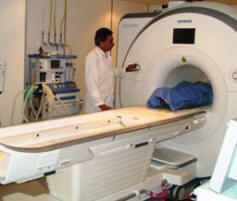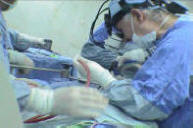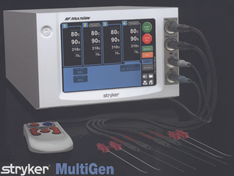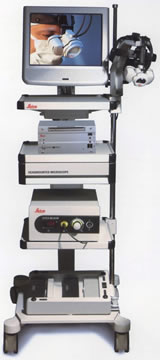|
|
Treatment
Although there is no known cure for multiple sclerosis,
several therapies have proven helpful. The primary aims
of therapy are returning function after an attack,
preventing new attacks, and preventing disability. As
with any medical treatment, medications used in the
management of MS have several adverse effects.
Alternative treatments are pursued by some people,
despite the shortage of supporting evidence.
Acute attacks
During symptomatic attacks, administration of high doses
of intravenous corticosteroids, such as
methylprednisolone, is the usual therapy, with oral
corticosteroids seeming to have a similar efficacy and
safety profile. Although, in general, effective in
the short term for relieving symptoms, corticosteroid
treatments do not appear to have a significant impact on
long-term recovery. The consequences of severe
attacks that do not respond to corticosteroids might be
treatable by plasmapheresis. |
|
Disease-modifying treatments
Relapsing remitting multiple sclerosis
Eight disease-modifying treatments have been approved by
regulatory agencies for relapsing-remitting multiple
sclerosis (RRMS) including: interferon beta-1a,
interferon beta-1b, glatiramer acetate, mitoxantrone,
natalizumab, fingolimod, teriflunomide and dimethyl fumarate.
Their cost effectiveness as of 2012 is unclear.
In RRMS they are modestly effective at decreasing the
number of attacks. The interferons and glatiramer
acetate are first-line treatments and are roughly
equivalent, reducing relapses by approximately 30%.
Early-initiated long-term therapy is safe and improves
outcomes. Natalizumab reduces the relapse rate
more than first-line agents; however, due to issues of
adverse effects is a second-line agent reserved for
those who do not respond to other treatments or with
severe disease. Mitoxantrone, whose use is limited
by severe adverse effects, is a third-line option for
those who do not respond to other medications.
Treatment of clinically isolated syndrome (CIS) with interferons decreases the chance of progressing to
clinical MS. Efficacy of interferons and
glatiramer acetate in children has been estimated to be
roughly equivalent to that of adults. The role of
some of the newer agents such as fingolimod,
teriflunomide, and dimethyl fumarate, as of 2011, is not
yet entirely clear.
Progressive multiple sclerosis
No treatment has been shown to change the course of
primary progressive MS and as of 2011 only one
medication, mitoxantrone, has been approved for
secondary progressive MS. In this population
tentative evidence supports mitoxantrone moderately
slowing the progression of the disease and decreasing
rates of relapses over two years.
Adverse effects
The disease-modifying treatments have several adverse
effects. One of the most common is irritation at the
injection site for glatiramer acetate and the
interferons (up to 90% with subcutaneous injections and
33% with intramuscular injections). Over time, a
visible dent at the injection site, due to the local
destruction of fat tissue, known as lipoatrophy, may
develop. Interferons may produce flu-like
symptoms; some people taking glatiramer experience a
post-injection reaction with flushing, chest tightness,
heart palpitations, breathlessness, and anxiety, which
usually lasts less than thirty minutes. More
dangerous but much less common are liver damage from interferons, systolic dysfunction (12%),
infertility, and acute myeloid leukemia (0.8%) from mitoxantrone, and progressive multifocal
leukoencephalopathy occurring with natalizumab
(occurring in 1 in 600 people treated).
Fingolimod may give rise to hypertension and
bradycardia, macular edema, elevated liver enzymes or a
reduction in lymphocyte levels. Tentative evidence
supports the short term safety of teriflunomide, with
common side effects including: headaches, fatigue,
nausea, hair loss, and limb pain. There have also
been reports of liver failure and PML with its use and
it is dangerous for fetal development. Most common
side effects of dimethyl fumarate are flushing and
gastrointestinal problems. While dimethyl
fumarate may lead to a reduction in the white blood cell
count there were no reported cases of opportunistic
infections during trials.
Associated symptoms
Both medications and neurorehabilitation have been shown
to improve some symptoms, though neither changes the
course of the disease. Some symptoms have a good
response to medication, such as an unstable bladder and
spasticity, while others are little changed. For
neurologic problems, a multidisciplinary approach is
important for improving quality of life; however, it is
difficult to specify a 'core team' as many different
health services may be needed at different points in
time. Multidisciplinary rehabilitation programs
increase activity and participation of people with MS
but do not influence impairment level. There is
limited evidence for the overall efficacy of individual
therapeutic disciplines, though there is
good evidence that specific approaches, such as
exercise, and psychology therapies, in particular
cognitive behavioral approaches are effective.
Alternative treatments
Over 50% of people with MS may use complementary and
alternative medicine, although percentages vary
depending on how alternative medicine is defined.
The evidence for the effectiveness for such treatments
in most cases is weak or absent. While there is
tentative evidence that vitamin D may be useful,
evidence is insufficient for a definitive
conclusion. Treatments of unproven benefit used by
people with MS include: dietary supplementation and
regimens, relaxation techniques such as
yoga, herbal medicine (including medical
cannabis), hyperbaric oxygen therapy,
self-infection with hookworms, reflexology and
acupuncture. Regarding the characteristics of
users, they are more frequently women, have had MS for a
longer time, tend to be more disabled and have lower
levels of satisfaction with conventional healthcare. |






